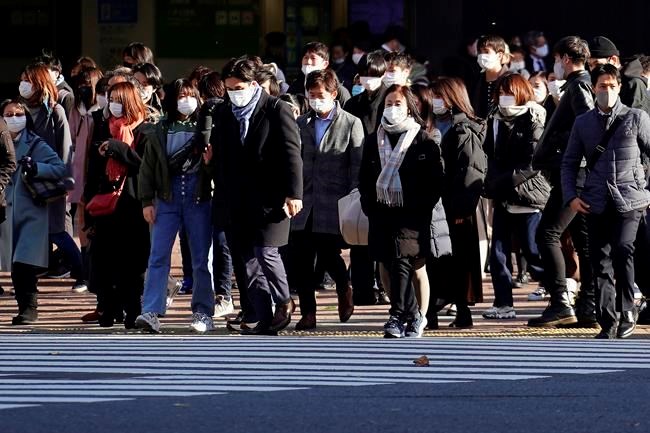BEIJING — Lockdown measures were being imposed in a northern Chinese province where coronavirus cases more than doubled in the region near Beijing that's due to host some events in next year's Winter Olympics.
Rail, air and highway connections to the Hebei capital of Shijiazhuang, a city of at least 10 million people, have been suspended and prevention and control measured tightened over urban communities and villages in the area. Classes have been suspended and school dormitories isolated.
The National Health Commission on Thursday announced 51 new cases had been confirmed in Hebei province, bringing the total to 90 since Sunday. Most have been in Shijiazhuang, although cases have also been recorded in the city of Xingtai.
Hebei is adjacent to Beijing, the host city of the 2022 Games, and some of the Olympic events are scheduled to be held in Shijiazhuang.
Authorities have also imposed similarly tight measures in the cities of Shenyang and Dalian in Liaoning province just to the north.
Wary of a new wave of infections, China is discouraging travel over next month’s Lunar New Year holiday and beginning school holidays a week early.
The increase in cases comes as China and the World Health Organization are negotiating terms for a visit by WHO investigators looking into the origins of the coronavirus, which was first detected in the central city of Wuhan in late 2019.
WHO Director-General Tedros Adhanom Ghebreyesus said Tuesday he was disappointed at the lack of permission for the experts to travel to Wuhan, but Chinese Foreign Ministry spokesperson Hua Chunying said China’s disease experts were currently busy with multiple small-scale clusters and outbreaks reported in the past couple of weeks.
“To ensure that the work of the global experts group in China is successful, we need to carry out the necessary procedures and relevant concrete plans. Currently both sides are still in negotiations on this,” Hua told reporters at a briefing on Wednesday.
China has reported a total of 87,278 cases of COVID-19 and 4,634 deaths.
In other developments in the Asia-Pacific region:
— Japan has declared a state of emergency for Tokyo and three nearby areas as coronavirus cases continue to surge, hitting a daily record of 2,447 in the capital. Prime Minister Yoshihide Suga issued the declaration at the government task force for the coronavirus. It kicks in Friday until Feb. 7, and
— Thailand’s government has tightened travel restrictions in parts of the country to fight a new virus surge, as it registered 305 new cases and another death. Taweesilp Visanuyothin, a spokesperson for the COVID-19
— South Korea says it will extend its ban on incoming flights from Britain for two more weeks until Jan. 21. Authorities said Thursday they’ve found three additional cases of the more contagious variant of the coronavirus identified in the U.K, taking the total to 14. South Korea has also found one case of a coronavirus variant detected in South Africa. All foreigners entering South Korea will be required to submit negative COVID-19 test results starting Friday. Officials say a recent outbreak appears to have peaked because they aren’t seeing a further upsurge in infections. The country reported 870 new cases on Thursday, the third day in a row that the figure has been below 1,000. The new cases took the national caseload to 66,688 with 1,046 deaths. South Korea on Monday extended its second-highest social distancing rules, called “Tier 2.5,” in the greater Seoul area and the third-highest rules in other areas for two more weeks.
— Australia is bringing forward its COVID-19 vaccination rollout to mid-February with plans to inoculate 15% of the population by late March. It had planned to start vaccinations in March after the government argued against an emergency rollout because of lower transmission rates than other countries. Prime Minister Scott Morrison said he expected the Pfizer vaccine would be delivered two weeks after the Australian regulator approved it in late January. “It is moving considerably faster than normal vaccination approval processes would occur but without skipping a step, without cutting a corner, ensuring that everything that needs to be ticked is ticked along the way,” Morrison said. The University of Oxford vaccine was expected to have Australian regulatory approval in February. That vaccine would be manufactured in Australia by Melbourne-based biopharmaceutical company CSL in partnership with British-Swedish company AstraZeneca. The vaccine produced jointly by Pfizer and BioNTech will be imported.
The Associated Press


